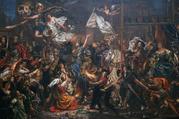Click here if you don’t see subscription options


Take to Heart
In The Moment, the Message, the Messenger (4/24), Tom Fox has issued a timely and eloquent plea for our collective commitment to convey the treasure of Catholic social teaching to our country. I share his conviction that our teaching can effect profound social change. At Catholic Relief Services, our re-examination and reflection on the church’s social teaching over the last decade has fueled an institutional transformation. We moved from being an agency that primarily engages in relief and development to one that also promotes justice, human dignity and global solidarity through all of our programs.
In that spirit, and at the risk of ruining a good Catholic construct of seven points, I would like humbly to propose an addition to Mr. Fox’s list of suggestions not only for better communicating the church’s social teaching but also for helping Catholics to live it. We must foster a sense of solidaritywith God, with all of humanity and with creation.
Solidaritythe conviction that we are responsible for and connected to one another, especially those who are poor and marginalizedcalls us to cherish and uphold the sacredness and dignity of every person, commit to and practice peace, justice and reconciliation, and celebrate and protect the integrity of all creation. At C.R.S. we believe that global solidaritystanding with our brothers and sisters overseaswill transform the world.
There are many ways for Catholics to practice global solidarity, such as making just economic choices by buying fair trade products, participating in a partnership with a parish or diocese overseas, advocating for just and transparent government policies or supporting missionary or relief efforts overseas. Catholic Relief Services provides these opportunities and more, to help Catholics put their faith into action on an international scale.
Both the Gospel and Catholic social teaching compel us to live as one human family by respecting the dignity of every human person, loving our neighbors as ourselves and promoting more just and peaceful societies. In other words, we are called to live in global solidarity. It is a message we all must hear and take to heart.
Joan Neal








